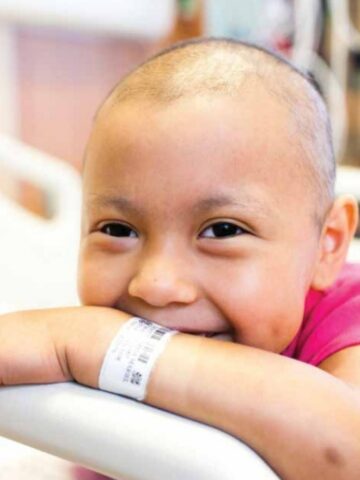 The international conversation begun at last October’s “Pediatrics 2040” has coalesced into a continuing global discussion among the best minds in pediatric innovation. The inaugural, invitation-only Pediatric Innovation Leadership Forum, held at the Ritz-Carlton Dana Point in June, brought pediatric hospitals and industry leaders together to share the ideas that are transforming pediatric medicine.
The international conversation begun at last October’s “Pediatrics 2040” has coalesced into a continuing global discussion among the best minds in pediatric innovation. The inaugural, invitation-only Pediatric Innovation Leadership Forum, held at the Ritz-Carlton Dana Point in June, brought pediatric hospitals and industry leaders together to share the ideas that are transforming pediatric medicine.
Sponsored by the Sharon Disney Lund Medical Intelligence and Innovations Institute (Mi4) at CHOC, the two-day program was the first of its kind among hospital innovation centers. Speakers shared presentations on artificial intelligence, genomic medicine, regenerative medicine, nanotechnology, robotic surgery, digital medicine, mobile technology, personalized medicine and biomedical informatics.
As many institutions are engaging in similar initiatives, the Q&A session immediately following each presentation provided an invaluable opportunity to share insights and collaborate on solutions. Several participants live-tweeted the program, and further discussion took place on social media following the event.
“The camaraderie was palpable and the sense of purpose was inspiring,” said Dr. Anthony Chang, medical director of the CHOC Heart Institute. “There was ardent support to continue this group gathering and promote the exchange of ideas and future group projects.”
Future gatherings will focus on three areas, including clinical collaboration on key pediatric clinical issues, such as obesity and funding for innovation, as well as group education on emerging technologies. Dr. Chang also plans an academic, international collaborative consortium, and, eventually, a society with multidisciplinary focus on pediatric innovation. Additionally, he cited the need for developing the philanthropic and business strategies that will allow pediatric innovation to flourish.
Continuing the Discussion
From wearable devices that detect conditions before they occur, to the use of artificial intelligence for decision support,  evolving technology has the potential to deliver more personalized healthcare while improving overall population health.
evolving technology has the potential to deliver more personalized healthcare while improving overall population health.
The best innovation is “disruptive.” As explained by David Westbrook, senior vice president of Strategy and Innovation at Children’s Mercy Kansas City, disruptive innovation is that which may initially threaten the status quo, but ultimately raises the quality of health care for all. And when brought to scale, disruptive technology becomes simple, accessible and affordable, making the older ways of doing things obsolete.
Another highlight of the program was the presentation by Stanford physician-scientist and TED presenter Daniel Kraft, M.D. Via Skype, Dr. Kraft shared his perspectives about promoting pediatric innovation and leveraging parents to help this cause.
CHOC and Children’s Hospital Seattle have teamed to ensure these international discussions continue. Dr. Sharief Taraman, CHOC pediatric neurologist and medical informaticist, and Dr. Wendy Sue Swanson, pediatrician and executive director of digital health at Seattle Children’s, are pursuing an online platform that will allow pediatric institutions, business partners and sponsors to easily share information and collaborate on evolving technology.
“Providers who excel at leveraging innovation and technologies to improve outcomes and earlier discharges, and build healthier communities to prevent children from becoming future patients will be at a competitive advantage in this new healthcare landscape,” said Spyro Mousses, Ph.D., executive scientific advisor at CHOC.
Care to join the discussion? Follow @peds2040 on Twitter and visit CHOC Docs. Come to the MI2 meetings held on the third Monday of the month. For more information, contact Dr. Chang at [email protected].
We appreciate the more than 20 national and international pediatric institutions, as well as our supporting sponsors, that participated in the Pediatric Innovation Leadership Forum, on June 10 and 11.
This includes Boston Children’s Hospital, Children’s Healthcare of Atlanta, Children’s Hospital of Michigan, Children’s Hospital of Colorado, Children’s Mercy Hospital, Rainbow Babies & Children’s Hospital, Texas Children’s Hospital, Lucille Packard Children’s Hospital Stanford, Children’s National Health System, Children’s Hospital Los Angeles, CHOC Hospital, Hospital Sant Joan de Déu (Barcelona, Spain), Kapi’olani Medical Center for Women & Children, Mattel Children’s Hospital UCLA, Nationwide Children’s Hospital, Rady Children’s Hospital, Seattle Children’s Hospital, Stanford University, Toronto Sick Kids, Penn State Hershey Medical Center, David Geffen School of Medicine at UCLA, Xin Hua Hospital, (Shanghai, China) and Institute of Pediatric Innovation (IPI). We also appreciate the support of our sponsors for making this medical technology forum possible: Sharon Disney Lund Medical Intelligence and Innovations Institute (Mi4) at CHOC, Cisco, Verizon, Masimo Foundation and Ikaria.




